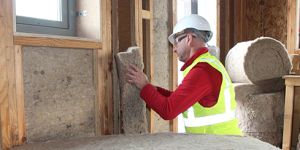 Homes need insulation to provide adequate noise absorption, to control heat levels and make a building more comfortable. Of the many insulation materials on the market, wool stands out as the ideal natural option for sustainable building insulation.
Homes need insulation to provide adequate noise absorption, to control heat levels and make a building more comfortable. Of the many insulation materials on the market, wool stands out as the ideal natural option for sustainable building insulation.
Furthermore, a sustainable insulation material like Wool is a key component of eco-friendly buildings, with growing environmental trends meaning every building is aiming towards becoming more sustainable overall.
Four reasons why you should choose wool as natural insulation material:
Reason #1: Wool is Flame Resistant
Wool’s flame-resistant properties are largely due to the fact that wool ignites less readily than other organic materials. Using wool as your chosen insulation material can help to prevent fire spreading, as it is more difficult to ignite compared to other textile materials and has a low combustion level. When it comes to fire in the home, fatalities are more likely within homes heavily equipped with soft furnishings. This means that, should you opt to have wool as your chosen furnishing material, this can increase the safety within your home. The structure of wool will actually swell when heated, meaning as wool burns it forms a carbonaceous layer which slows fire spread. Factsheet: Wool & Fire
Reason #2: Wool Improves Indoor Air Quality
Wool has the unique capability to absorb toxins and odours. Wool consists of amino acids that give it the ability to reduce air contaminants from various indoor sources. Volatile Organic Compounds within buildings, which are turned into vapour or gas from a combination of chemical elements, can cause air quality to deteriorate. These VOCs can actually be absorbed by wool when used as insulation material, therefore improving air quality. Factseet: Wool Interiors
Reason #3: Wool is Ideal Sound Insulation
 If insulation is needed in your building for sound purposes, such as improving the acoustics in a concert hall, theatre or even an office building where sound absorption is needed, then wool is the perfect choice. Wool works effectively to absorb noise and control acoustic frequency, which means you can depend on it to insulate your building effectively for noise level control.
If insulation is needed in your building for sound purposes, such as improving the acoustics in a concert hall, theatre or even an office building where sound absorption is needed, then wool is the perfect choice. Wool works effectively to absorb noise and control acoustic frequency, which means you can depend on it to insulate your building effectively for noise level control.
Reason #4: Wool Can Help Control Humidity Levels
Condensation and moisture problems can be rife in busy buildings, especially commercial buildings which see a lot of people daily. Mould and damage can easily occur as a result of moisture issues in the air within buildings which may suffer from poor ventilation. Using wool as an insulating textile material can help to soften the blow when it comes to the effect of moisture and humidity.
Source: IWTO 2020
Wikipedia: Wool Insulation
Wikipedia: Schafwolle als Dämmstoff

